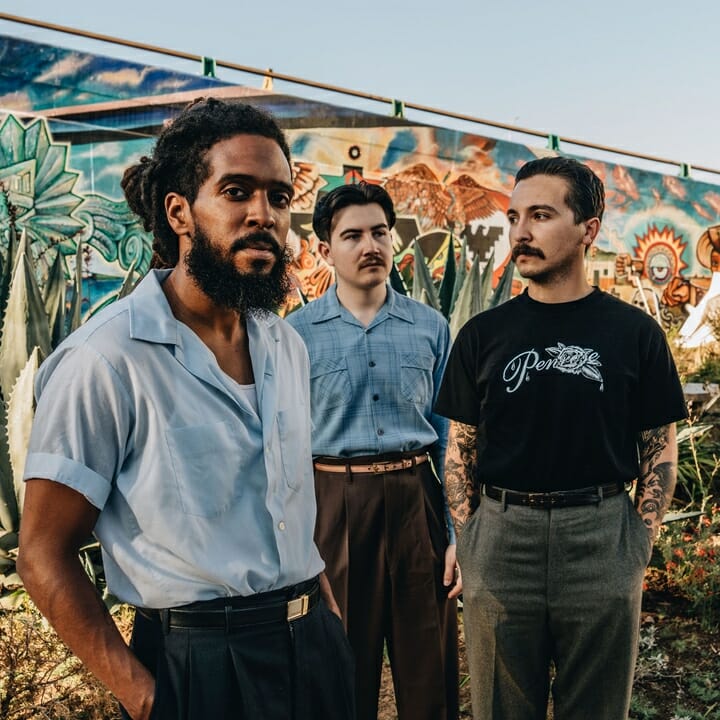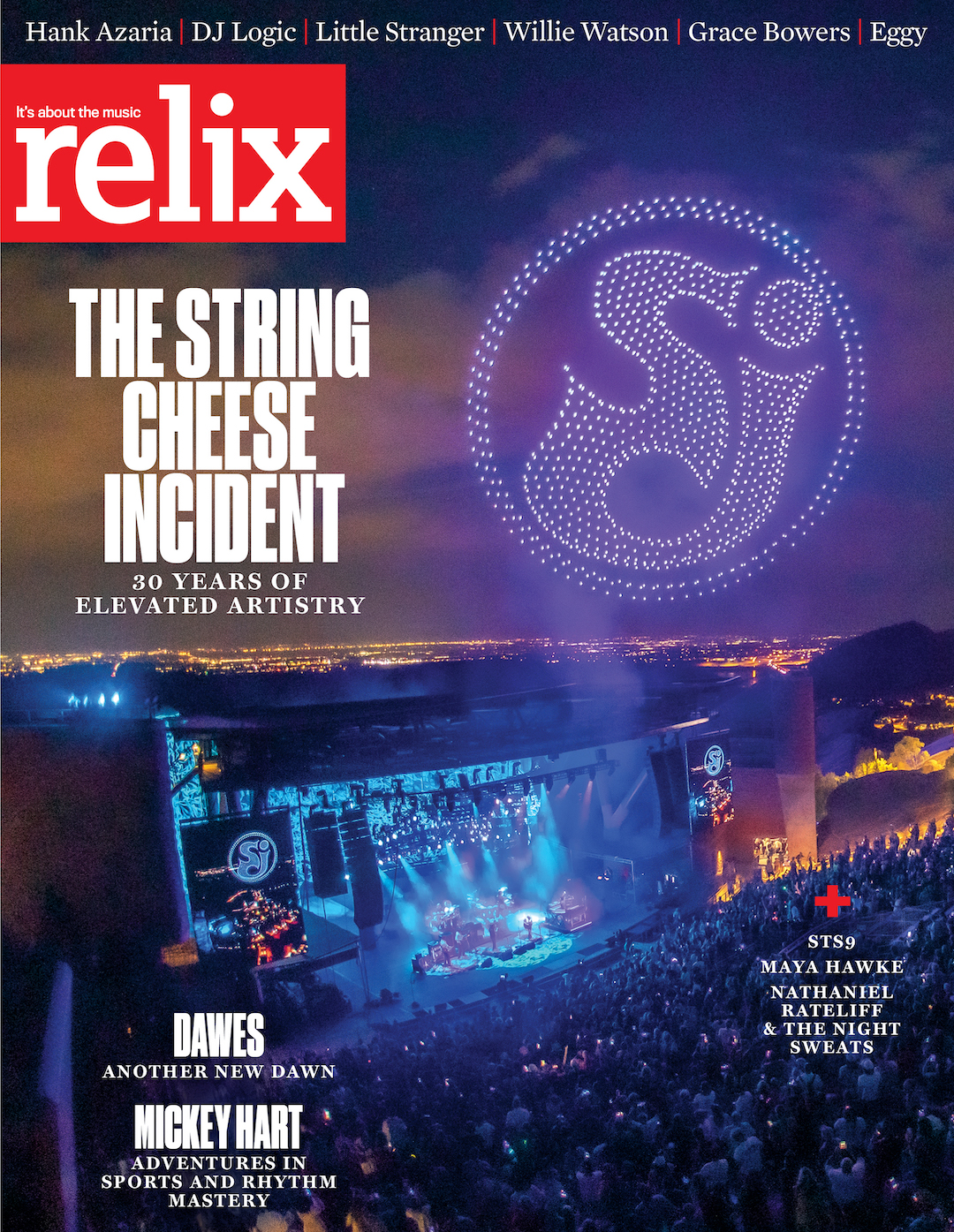Spotlight: Thee Sacred Souls

Photo: Gustav Olivares
***
For a band that has been hailed as the heirs to a timeless, if not retro style of music, the members of Thee Sacred Souls have a decidedly modern platform to thank for their formation—Instagram.
“Alex and Josh started following each other and that’s pretty much how it got started,” bassist Sal Samano says, while describing how he and drummer Alex Garcia first discovered singer Josh Lane. “Alex had a couple of demos that he’d been writing and started going back and forth with Josh after hearing some of the stuff that he had posted.”
San Diego residents Garcia and Samano initially met in 2018 when their bands ended up sharing a bill. Soon after, they began jamming together in the drummer’s garage, bonding over Chicano soul, the Westside Sound and their local low-rider culture. After Garcia and Lane exchanged DMs for a bit, the singer came over to jam in early 2019 and Thee Sacred Souls started honing in on their reverent spin on vintage soul, funk and R&B.
“I didn’t know about the project when I went over to Alex’s studio—I was just coming to jam with him based off of what we knew about each other from Instagram,” Lane says, while checking in from a tour stop in Arizona. “I liked them instantly. The instrumental for ‘Can I Call You Rose?’ was good enough that I was able to finish the lyrics and the melody within one sitting. It already had a really good chord structure and the production was there.”
A Sacramento native, Lane came of age listening to the gospel sounds he’d hear in church, studying classical music before turning his attention to classic soul. He spent time fronting the indie group Josh Lane & The Heartfelt and eventually moved to San Diego in 2017, where he hoped to make a name for himself as a dream pop/chillwave-influenced solo artist. However, thanks to Garcia and Samano—both of whom have Chicano roots— he quickly received an education in his adopted hometown’s native sounds.
“Alex and Sal would sit and listen to rare records, and they introduced me to the rare side of soul,” Lane says. “Before that, I was listening to a lot of Northern soul.”
Their first concert took place at a record shop one of their friends owned, and things took off almost immediately when Daptone records co-founder Gabe Roth showed up at their second-ever live performance. As Samano explains, he had heard a few 30-second clips of their demos—also on Instagram—and was impressed enough to seek out the trio.
“It was super DIY,” the bassist says of their debut appearance. “We organized everything ourselves. It was mainly our friends and the record collectors that we were hanging out with at that time. Our second gig was a few weeks later, and Gabe just came up to us, super casually, and said that we should make a record.”
Just three days after that momentous meeting, Thee Sacred Souls traveled to Roth’s Riverside, Calif., studio to cut a few tracks to analog tape. For the most part, the longtime DapKings bassist had a hands off approach, but he did offer some invaluable advice, helping trim and tighten tracks like “Weak for Your Love,” which was originally five minutes.
“It was a balance of having a strong voice and not trying to change the initial intention of the song,” Lane says. “He was mostly, as the producer, trying to give the songs the life he heard. It was a good balance of being there but not taking over.”
“He had open ears and wanted to see what direction we were headed,” Garcia adds.
Though the global pandemic hit just as Thee Sacred Souls were starting to pick up steam, Garcia believes the downtime actually helped the trio in the long run.
“It gave us time to finish the songs and plan out what the process would look like for the rest of the record,” he says. “We got our teams together—management and booking agents and all that—so, in some ways, it benefited us just to have more time because, nowadays, we are trying to find time to make all these things work because we’re on the road so much.”
Thee Sacred Souls released their self-titled full-length set on Daptone’s SoCal-focused Penrose imprint in August and the LP was immediately hailed as the record that “saved Daptone,” after the label lost stars like Sharon Jones, Charles Bradley and Naomi Shelton in short succession. Their updated deep grooves and Lane’s vibey falsetto quickly helped them score co-signs from Alicia Keys, Princess Nokia, Black Pumas, Timbaland and Gary Clark Jr., and they have already been sampled by Curren$y. They also made a name for themselves as a must-see live act in the vein of their Daptone predecessors, nabbing support spots for the likes of St. Paul & The Broken Bones and Belle and Sebastian. While Thee Sacred Souls remain a trio creatively, when they play live, they expand to a sevenpiece outfit, boasting guitar, keyboards and backing vocalists.
“We needed to take these songs that were recorded in the studio by the three of us and have people play the parts,” Lane says, noting that the band has utilized various musician pals to round out their live show since the beginning. “And if we have the finances, we have horns as well.”
A longtime recording buff who started tinkering around with a variety of instruments at a young age, Garcia often demos out the group’s instrumental passages first, but the trio has worked up songs in all different collaborative ways. “Future Love” even grew out of a loose jam when the drummer was playing around on guitar. And, between upcoming dates on their own and with bands like Portugal. The Man, they are already eyeing a return to the studio. “We’re just trying to balance tour life with the creative side of things,” Samano says. “We also want to keep recording.”
“Being that we’re a group of young songwriters that are Black and Brown, soul music was this proverbial handshake between both cultures,” Lane says. “Soul was intrinsically Black music in the beginning, and then Chicano culture took it and made it its own. When you think of some of the Chicano artists like Thee Midniters and Sunny Ozuna, there’s a spirit to this music that harkens back to our cultures and our ancestors.”




















